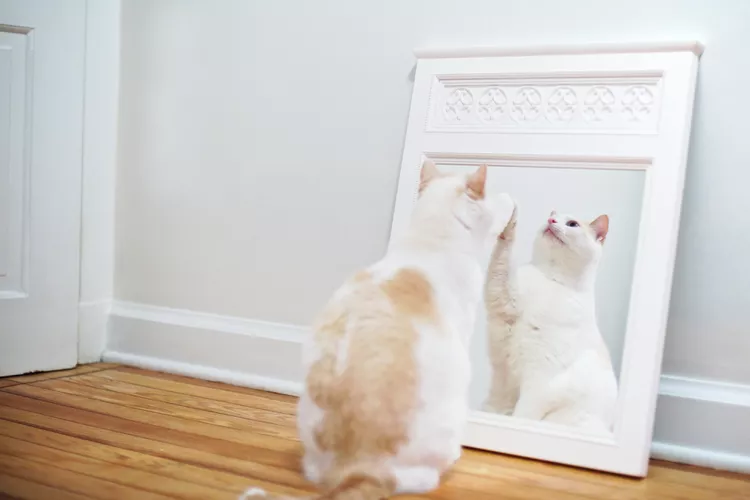
Cats know they're beautiful but their reaction to a cat reflection in the mirror varies widely. Some cats completely ignore the reflected kitty while others are curious, possibly wondering why this other feline doesn't have a unique scent. Still, other cats may exhibit aggressive or fearful behavior when they see their reflection. If your cat is showing a negative reaction, there are ways you can help.
Quite often, the key to helping a cat overcome a negative behavior to a stimulus is exploring the possible causes of their reaction. In the case of mirrors and reflections, there are a number of reasons a cat may act out, hide from the "intruder," or become genuinely terrified.
One of the most common is found in young cats who have never seen a mirror. Kittens who have lived their entire life in an animal shelter may not have been exposed to common household things like mirrors, carpet, or TVs and radios. When they are adopted and brought into a home, each of these things can bring on a fear of the unknown.
Other cats may be familiar with their reflection, then react when seeing another cat in a mirror. For instance, your kitten may be used to seeing its own reflection and associate that with a "happy" cat. Then, if you have another cat visit, your kitten can smell the new cat but not the cat's reflection. The absence of a distinct scent for this fourth cat can really throw a kitten off and invoke a reaction of stranger danger.
Another scenario involves a cat associating a reflection in a glass window with danger outside that window, such as a stray cat who wanders into your yard. A cat who is naturally scared or aggressive may come to associate this shiny surface of a mirror with the negative experience. They may also come to associate this hostility to their own reflection and become suspicious of that intruder, even if it was previously accepted.
Cats will react to reflections in various ways. It's good to observe your cat for a little bit to determine if it is displaying fearful or aggressive tendencies. For many cats, it's just a passing phase, part of growing up and experiencing their new world.
Quite often, cats attempt to find the other cat by pawing underneath or at the side of the mirror to "get around" the barrier preventing contact. It's similar to what many cats do when they see TV images of birds or other critters, mistaking the screen for a window.
A mirror-gazing kitty who cannot find the source may become suspicious so its fearful reflection also triggers defensive body language. Then, seeing its own aggressive/fearful/defensive language in the reflection makes it think that cat-in-the-mirror means business, so it reacts accordingly.
Many cats eventually figure out that the reflected cat is not a danger, but others do not. They may take it to the level of attacking the mirror in an attempt to ward off this intruder. The behavior may intensify and possibly become an obsession if it's not addressed.
In these cases, you may need to remove all reflective surfaces that are at your cat's level. In the least, you can tape paper or hang a cloth over mirrors so your cat can no longer see its reflection and gets to practice the aggressive behavior.
If you have observed that stray cats in the neighborhood are amping up your cat's reactivity to windows and mirrors, you will want to shoo them away. While you employ various tactics to keep cats out of your yard, keep the curtains closed so your cat does not see them. Once you've been successful in your deterrents, you can slowly go back to normal, open the curtains, and your cat may become more receptive to reflections again.
After some time of taking these preventative steps, you may be able to slowly reintroduce your cat to mirrors. When doing so, be sure the mirror is associated with positive experiences such as toys, treats, or catnip. Lure your cat in front of an exposed mirror with their favorite item and let them enjoy it. They may be distracted enough to ignore the reflection or notice that the reflection is also very happy and is not a threat.
In time and with more experience, most cats can put mirror-angst behind them. If your cat continues to have anxiety around mirrors, you may need some extra help. Pheromone products like Comfort Zone with Feliway can help calm upset feelings. You can spray this around the mirror or use a diffuser to spread the scent throughout the room.
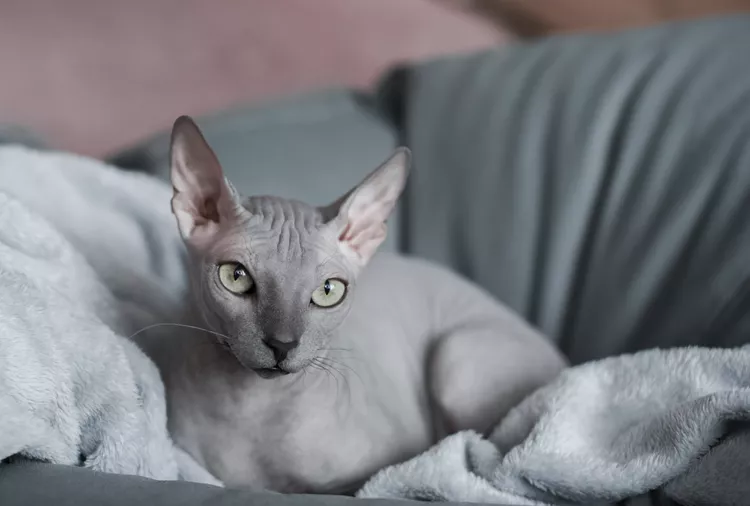
212 Hairless Cat Names For Your Beautifully Bald Feline
Discover the perfect name for your hairless cat with our list of over 200 creative and unique names. From quirky to classic, find a fitting choice for your beautifully bald feline companion.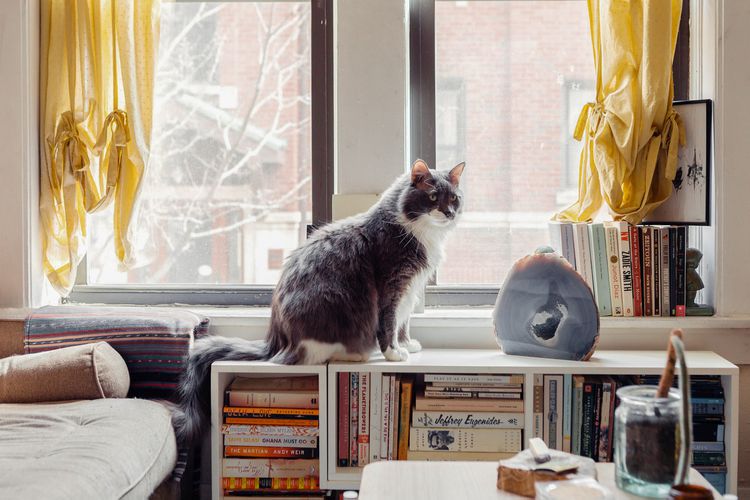
8 Things Your Cat Loves
Just like humans, cats can have a long list of things they like. Find out what cats love so you can keep your cat happy and healthy.
How to Tell If a Kitten is a Boy or a Girl
If you're wondering whether your new kitten is a boy or a girl, here are three ways to help determine the sex of your cat.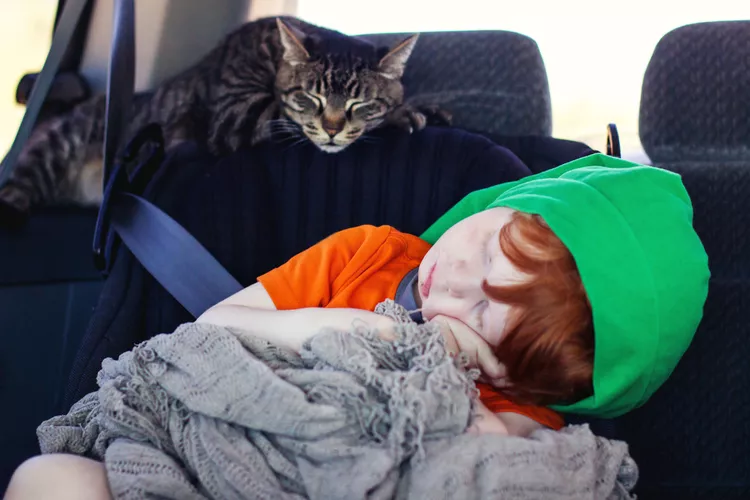
8 Tips to Help Cats Enjoy Car Travel
Cats are creatures of habit, and they hate to travel. Learn tips to prepare them for travel in the car, whether going to the vet or on vacation.
Common Causes of Mucus in Dog Poop
Seeing mucus in your dog's poop can be concerning to a dog owner. Here are common causes and treatment of mucus in a dog's stool.
Is Shrimp Bad For Dogs?
Shrimp can be a healthy, nutritional food for people but can dogs eat them, too? What are the main concerns with feeding shrimp to your dog?
Can Dogs Eat Grapes?
Are grapes safe for dogs? Grapes and raisins can cause serious toxicity in dogs. Find out what to do if your dog eats grapes.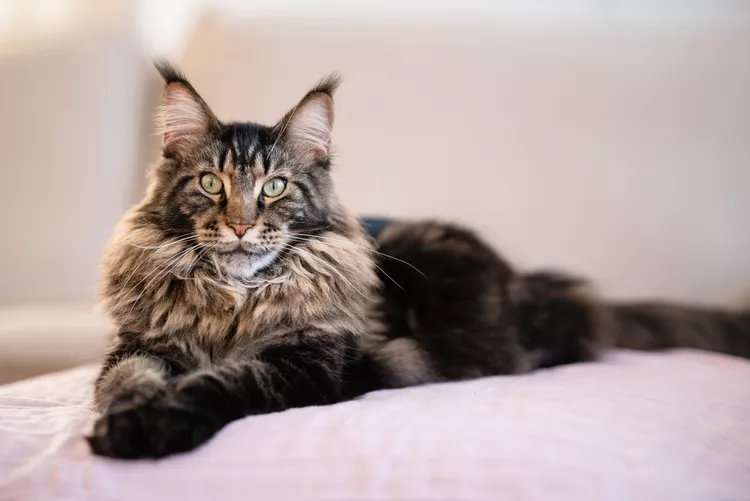
Maine Coon Cat: Breed Profile, Characteristics & Care
The Maine Coon cat is of the largest cat breeds in the world. These amiable, gentle cats make great companions. Learn about the Maine Coon cat breed's appearance, temperament, health, and care needs.
Selkirk Rex: Cat Breed Profile, Characteristics & Care
The Selkirk Rex is a charming cat with a tousled coat and a loving, laid-back personality. Learn about the Selkirk Rex breed.
How to Stop Your Cat From Chewing Electrical Cords
Cats are known to pounce and attack inanimate objects, like electrical cords. Learn how to prevent your cat from ambushing objects that may harm it.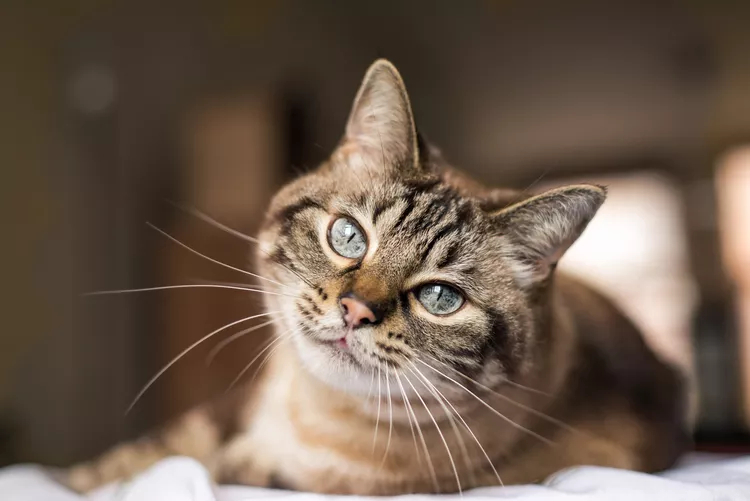
What Do Cats Think About?
Have you ever wondered what cats think about? A number of studies have explored cat behavior and feline cognition, but there's still more to learn.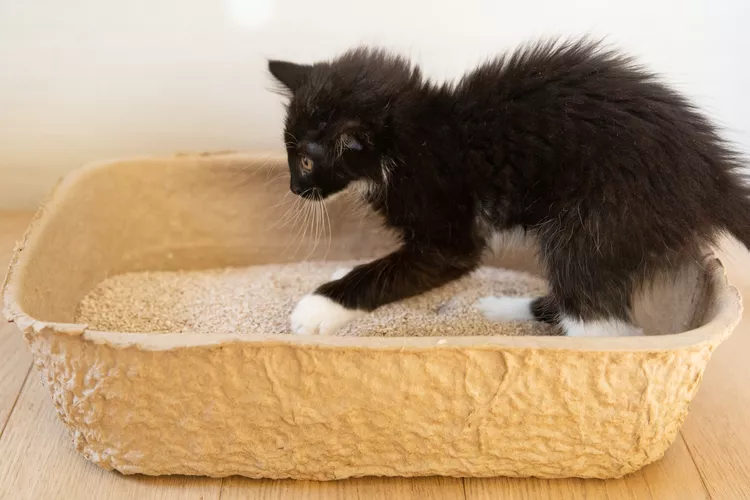
Training Your Kitten to Use the Litter Box
Bringing home a new kitten means they need to learn how to properly use a litter box. Discover how to successfully litter box train your kitten.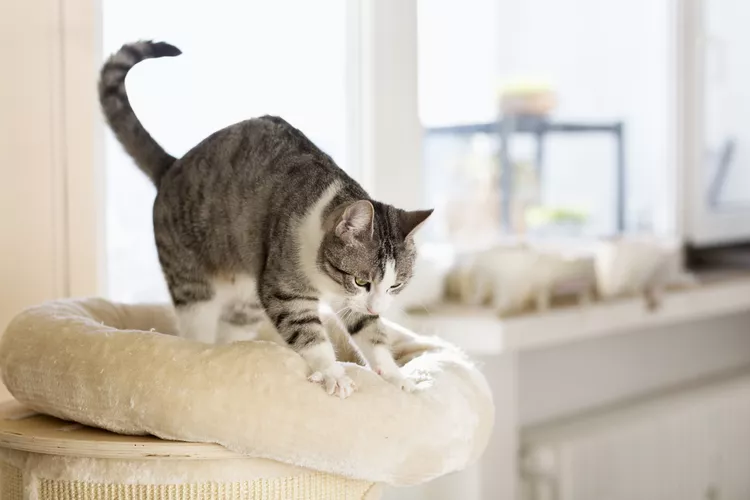
Why Do Cats Knead?
Kneading is a common behavior in cats of all ages. Learn why cats "make biscuits" and what it means for you, your cat, and all your blankets.
Dandie Dinmont Terrier: Dog Breed Characteristics & Care
Learn about the Dandie Dinmont Terrier, a silky dog breed with a signature puff of hair atop its head and a friendly, companionable personality.
Tibetan Mastiff: Dog Breed Characteristics & Care
Learn about the Tibetan mastiff, an ancient guardian dog breed. This breed is known for their massive stature, flowing mane, and protective personality.
4 Reasons Why Your Dog Licks Their Butt
Butt-licking in dogs can be a part of normal grooming, but excessive butt-licking is not normal. Read about the most common reasons for this behavior.
How to Teach Your Dog the "Leave It" Command
Training your dog the "leave it" command is a great way to instill self-control. Learn how to teach your dog to not pick things up from the ground.
How to Solve Your Dog's Fear of Car Rides
Is your dog scared of car rides? This fear of riding in cars is common. Learn why your dog is scared of car rides and how to help conquer this fear.
Can Dogs Get Depression? How to Help Your Sad Dog
Can dogs get depression? Learn about the signs of depression in dogs and find out how to help your sad dog.
How to Play Tug of War With Your Dog
Many dogs love to play tug of war, and it's a healthy game that provides great exercise. Learn the best way to safely play tug of war with your dog.